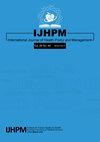COVID-19限制的严格程度如何影响遵守和幸福的动机:相称性的关键作用
IF 3.1
3区 医学
Q2 HEALTH CARE SCIENCES & SERVICES
International Journal of Health Policy and Management
Pub Date : 2023-09-25
DOI:10.34172/ijhpm.2023.8021
引用次数: 1
摘要
背景:各国政府为抗击COVID-19大流行而采取的措施的严格程度因国家和时间的不同而有很大差异。在本研究中,我们考察了流行病学情况的比例性与公民行为、动机和心理健康的关系。方法:在2020年3月至2022年3月的421天内,273,722名比利时参与者(Mage = 49.47;63.9%的女性;(33%单身)完成了一份在线问卷。采用多元线性混合回归模型检验流行病学情况(如实际住院人数所示)与预测感兴趣变量的日常变化的严格性指数之间的相互作用。结果:系统的证据表明,相对于比例的情况,不比例的情况与适应不良结果的明确模式有关。具体而言,当严格或宽松的措施与流行病学情况不成比例时,人们报告的自主动机较低,控制动机和动机较多,遵守卫生规则较少,感知感染风险较高,需求满意度较低,焦虑和抑郁症状较高。感知到的风险严重程度尤其随措施的严格程度而变化。在绝对水平上,在采取相应宽松措施的日子里,公民报告的需求满意度和心理健康状况最高。结论:严格的措施本身不会使人们失去动力或损害人们的福祉,宽松的措施也不会激励或提高人们的福祉。只有比例措施,即严格程度与实际流行病学情况相一致的措施,才能带来最大的动机、行为和精神健康益处。本文章由计算机程序翻译,如有差异,请以英文原文为准。
How the Stringency of the COVID-19 Restrictions Influences Motivation for Adherence and Well-Being: The Critical Role of Proportionality
Background: The stringency of the measures taken by governments to combat the COVID-19 pandemic varied considerably across countries and time. In the present study, we examined how the proportionality to the epidemiological situation is related to citizens’behavior, motivation and mental health. Methods: Across 421 days between March 2020 and March 2022, 273,722 Belgian participants (Mage = 49.47; 63.9% female; 33% single) completed an online questionnaire. Multiple linear mixed regression modeling was used to examine the interaction between the epidemiological situation, as indicated by the actual hospitalization numbers, and the stringency index to predict day-to-day variation in the variables of interest. Results: Systematic evidence emerged showing that disproportional situations, as opposed to proportional situations, were associated with a clear pattern of maladaptive outcomes. Specifically, when either strict or lenient measures were disproportional in relation to the epidemiological situation, people reported lower autonomous motivation, more controlled motivation and amotivation, less adherence to sanitary rules, higher perceived risk of infection, lower need satisfaction, and higher anxiety and depressive symptoms. Perceived risk severity especially covaried with the stringency of the measures. At the absolute level, citizens reported the highest need satisfaction and mental health during days with proportional lenient measures. Conclusion: Stringent measures are not per se demotivating or compromising of people’s well-being, nor are lenient measures as such motivating or enhancing well-being. Only proportional measures, that is, measures with a level of stringency that is aligned with the actual epidemiological situation, are associated with the greatest motivational, behavioral, and mental health benefits.
求助全文
通过发布文献求助,成功后即可免费获取论文全文。
去求助
来源期刊

International Journal of Health Policy and Management
Health Professions-Health Information Management
CiteScore
5.40
自引率
14.30%
发文量
142
审稿时长
9 weeks
期刊介绍:
International Journal of Health Policy and Management (IJHPM) is a monthly open access, peer-reviewed journal which serves as an international and interdisciplinary setting for the dissemination of health policy and management research. It brings together individual specialties from different fields, notably health management/policy/economics, epidemiology, social/public policy, and philosophy into a dynamic academic mix.
 求助内容:
求助内容: 应助结果提醒方式:
应助结果提醒方式:


